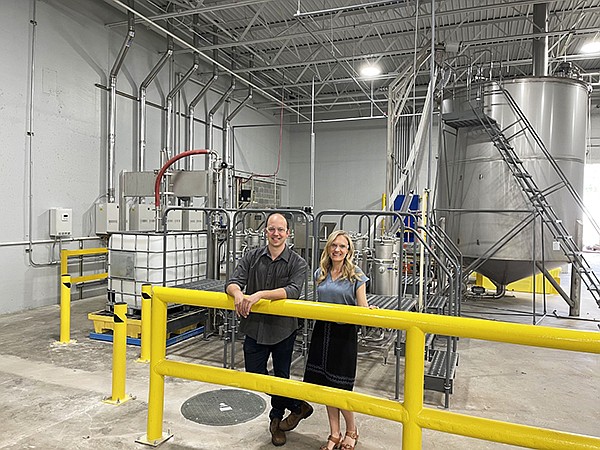Leigh Fibers Partners With Tidal Vision to Produce Bio-based Textile Treatments
Textiles
Craig Kasberg and Kari Ingalls of Tidal Vision are bringing the company’s Tidal-Tex textile treatments to Leigh Fibers’ 1 million-square-foot facility in South Carolina. | Photo courtesy of Tidal Vision
As of Thursday, July 8, 2021
Solving issues of the toxicity that could result from traditional textile treatments, Leigh Fibers and Tidal Vision have announced a partnership that will rely on sustainable, ecologically sound resources to improve this segment of the industry. With the opening of a new production facility in Wellford, S.C., Tidal Vision’s Tidal-Tex water-based textile treatments, which incorporate chitosan, will be applied to products from Leigh Fibers, which is known for its textile-waste conversion.
“Our partnership with Leigh Fibers signals a transformational shift in the textile industry’s access to sustainable, bio-based textile treatments that are now displacing millions of pounds of synthetic, often toxic chemical treatments used in the textile industry,” said Tidal Vision Director of Business Development in Textiles Kari Ingalls. “Tidal Vision partnering with Leigh Fibers has given us an extra 24,000 square feet of production space—83,000 square feet total and the capacity to produce a total of 1,600 to 2,000 metric tons of liquid chitosan solutions per month.”
Tidal-Tex products serve as an alternative to nonbiodegradable chemicals, which include silver and copper. To create Tidal-Tex, Tidal Vision processes its chitosan through crab and shrimp shells, sourced as by-products from seafood-industry waste. A nontoxic, biodegradable polymer, chitosan is a product that can be added to a textile manufacturer’s existing system.
“Tidal-Tex is used by manufacturers of fiber at the top of the supply chain, such as Leigh Fibers,” Ingalls said. “Those fibers are turned into textiles by textile manufacturers further down the supply chain, and the treated products end up in all sorts of products from furniture, mattresses, carpet and more. There are a lot of apparel brands that have been reaching out to us and our customers recently, and we believe this demand will continue to grow from this segment of the larger textile industry.“
The South Carolina location of the facility where the Bellingham, Wash.–headquartered Tidal Vision will produce its Tidal-Tex within Leigh Fibers’ 1 million-square-foot headquarters is centrally located in a hub of the United States textile industry. Tidal-Tex is applied via a simple act of dipping, spraying or coating. As a versatile product, Tidal-Tex can be applied to fibers, yarn, and woven and nonwoven fabrics. Through this partnership, the use of the facility will allow Tidal-Tex to be available at a lower cost than more-traditional treatments.
“Partnering with Tidal Vision is a win-win for our company, our customers and the environment,” said Eric Westgate, senior vice president of Leigh Fibers, in a statement. “Their Tidal-Tex product line delivers the key benefits that our customers look for in textiles at a lower price and is made from sustainable materials in the USA. At Leigh Fibers, we’re committed to advancing sustainable innovation and repurposing textiles for a cleaner, healthier planet.”
Tidal-Tex is offered in different formulas to address the distinct needs of those within the textile industry. Formulas of Tidal-Tex include biostatic, fire-retardant and anti-odor treatments. With Tidal Vision’s proprietary cross-linking technology, Tidal-Tex also affords wash durability.
“Our mission is to create positive and systemic environmental impact,” said Tidal Vision’s Chief Executive Officer Craig Kasberg in a statement. “In the textile industry, to have the biggest impact, it made sense to start with fibers treated at the top of the supply chain. Leigh Fibers was our ideal partner since their mission, values and business model are so synergetic with ours. Both of our companies produce sustainable solutions by upcycling byproducts that would otherwise end up in landfills, and through vertical integration we provide high-performance products out of what was previously considered waste.”
As both companies look forward to partnering together, their main focus is on creating an eco-friendlier treatment alternative for the fiber and textile industries to bypass potentially harmful formulas. By spreading the word regarding the benefits of chitosan-based products, Ingalls feels that the sky is the limit regarding the areas in which Tidal-Tex can aid different industries to clean up their processes from deep within the supply chain at the very building blocks used to create popular products.
“We feel that the most important piece is the total impact of replacing millions of pounds of synthetic, often toxic chemicals with our safe, bio-based, sustainable product,” Ingalls said. “The fibers that Leigh Fibers treats end up down the supply chain in hundreds, if not thousands, of consumer products.“
